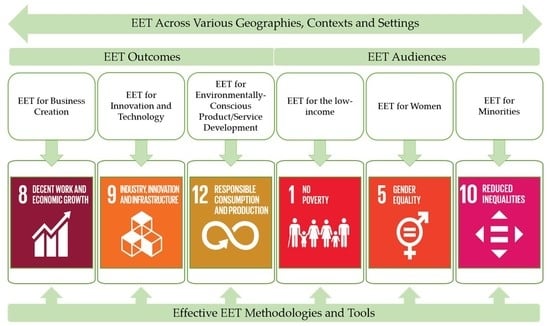Entrepreneurship Education and Sustainable Development Goals: A literature Review and a Closer Look at Fragile States and Technology-Enabled Approaches
Abstract
1. Introduction
2. Theoretical Background
3. Systematic Review of EET Literature
4. Findings and Discussion
4.1. Bibliometrics
4.2. Country Context
4.3. Recipients
4.4. Outcomes, Methods and Tools
4.5. EET Challenges
5. A Closer Look: EET Challenges amid Fragility
6. Tackling the Challenges: The Promise of Technology
7. Conclusions and Limitations
Funding
Acknowledgments
Conflicts of Interest
References
- World Bank. World Bank: Fragility, Conflict and Violence. 4 March 2018. Available online: http://www.worldbank.org/en/topic/fragilityconflictviolence/overview (accessed on 11 January 2018).
- OECD. States of Fragility 2016; Organisation for Economic Co-operation and Development: Paris, France, 2016. [Google Scholar]
- International Alert. If Victims Become Perpetrators: Factors Contributing to Vulnerability and Resilience to Violent Extremism in the Central Sahel; International Alert: London, UK, 2018. [Google Scholar]
- Aubrey, M.; Aubrey, R.; Brodrick, F.; Brooks, C. Why Young Syrians Choose to Fight: Vulnerability and Resilience to Recruitment by Violent Extremist Groups in Syria; International Alert: London, UK, 2016. [Google Scholar]
- United Nations. World Youth Report: Youth and the 2030 Agenda for Sustainable Development; United Nations: New York, NY, USA, 2017. [Google Scholar]
- Apostolopoulos, N.; Al-Dajani, H.; Holt, D.; Jones, P.; Jones, N.R. Entrepreneurship and the Sustainable Development Goals. In Entrepreneurship and the Sustainable Development Goals; Emerald Publishing Limited: Bingley, UK, 2018; pp. 1–7. [Google Scholar]
- Baumol, W.J.; Litan, R.E.; Schramm, C.J.; Strom, R.J. Innovative Entrepreneurship and Policy: Toward Initiation and Preservation of Growth. In The Economics of Small Businesses: An International Perspective; Physica-Verlag Heidelberg: Heidelberg, Germany, 2011; pp. 3–23. [Google Scholar]
- Martin, B.C.; McNally, J.J.; Kay, M.J. Examining the formation of human capital in entrepreneurship: A meta-analysis of entrepreneurship education outcomes. J. Bus. Ventur. 2013, 28, 211–224. [Google Scholar] [CrossRef]
- Walter, S.G.; Block, J.H. Outcomes of entrepreneurship education: An institutional perspective. J. Bus. Ventur. 2016, 31, 216–233. [Google Scholar] [CrossRef]
- Naude, W. Peace, Prosperity, and Pro-Growth Entrepreneurship. In United Nations University World Institute for Development Economic Research (UNU-WIDER); Working Paper 2; United Nations University: Helsinki, Finland, 2007. [Google Scholar]
- Ács, Z. How Is Entrepreneurship Good for Economic Growth? Innov. Technol. Gov. Glob. 2006, 1, 97–107. [Google Scholar]
- Karnani, A. The Bottom of the Pyramid Strategy for Reducing Poverty: A Failed Promise; DESA Working Paper No. 80; United Nations: New York, UK, USA, 2009. [Google Scholar]
- Kremer, M.; Brannen, C.; Glennerster, R. The Challenge of Education and Learning in the Developing World. Science 2017, 340, 297–300. [Google Scholar] [CrossRef] [PubMed]
- Nye, B.D. Intelligent Tutoring Systems by and for the Developing World: A Review of Trends and Approaches for Educational Technology in a Global Context. Int. J. Artif. Intell. Educ. 2015, 25, 177–203. [Google Scholar] [CrossRef]
- Woolf, B.P.; Lane, H.C.; Chaudhri, V.K.; Kolodner, J.L. AI Grand Challenges for Education. AI Mag. 2013, 34, 66–84. [Google Scholar] [CrossRef]
- ITC. ICT Facts and Figures 2017; International Telecommunication Union: Geneva, Switzerland, 2017. [Google Scholar]
- Valerio, A.; Parton, B.; Robb, A. Entrepreneurship Education and Training Programs around the World: Dimensions for Success; The World Bank: Washington, DC, USA, 2014. [Google Scholar]
- Fayolle, A. Personal views on the future of entrepreneurship education. Entrep. Reg. Dev. 2013, 25, 692–701. [Google Scholar] [CrossRef]
- Eichler, G.M.; Schwarz, E.J. What Sustainable Development Goals Do Social Innovations Address? A Systematic Review and Content Analysis of Social Innovation Literature. Sustainability 2019, 11, 522. [Google Scholar] [CrossRef]
- Baumol, W.J. The Microtheory of Innovative Entrepreneurship; Princeton University Press: Princeton, NJ, USA, 2010. [Google Scholar]
- Griffiths, M.; Kickul, J.; Bacq, S.; Terjesen, S. A Dialogue With William J. Baumol: Insights on Entrepreneurship Theory and Education. Entrep. Theory Pract. 2012, 36, 611–625. [Google Scholar] [CrossRef]
- Minniti, M.; Lévesque, M. Entrepreneurial types and economic growth. J. Bus. Ventur. 2010, 25, 305–314. [Google Scholar] [CrossRef]
- Audretsch, D.B. Entrepreneurship capital and economic growth. Oxf. Rev. Econ. Policy 2007, 23, 63–78. [Google Scholar] [CrossRef]
- Baumol, W.J.; Strom, R.J. Entrepreneurship and economic growth. Strat. Entrep. J. 2007, 1, 233–237. [Google Scholar] [CrossRef]
- Fogel, K.H.A.; Morck, R.; Yeung, B. Institutional Obstacles to Entrepreneurship. In The Oxford Handbook of Entrepreneurship; Oxford University Press: Oxford, UK, 2009. [Google Scholar]
- Koveos, P.; Yimin, Z. Regional Inequality and Poverty in Pre- and Postreform China: Can Entrepreneurship Make a Difference? Thunderbird Int. Bus. Rev. 2012, 54, 59–72. [Google Scholar] [CrossRef]
- Khan, R. How Frugal Innovation Promotes Social Sustainability. Sustainability 2016, 8, 1034. [Google Scholar] [CrossRef]
- Pansera, M.; Sarkar, S. Crafting Sustainable Development Solutions: Frugal Innovations of Grassroots Entrepreneurs. Sustainability 2016, 8, 51. [Google Scholar] [CrossRef]
- Kato, M.P.; Kratzer, J. Empowering Women through Microfinance: Evidence from Tanzania. ACRN J. Entrep. Perspect. 2013, 2, 31–59. [Google Scholar]
- Huis, M.; Lensink, R.; Vu, N.; Hansen, N. Impacts of the Gender and Entrepreneurship Together Ahead (GET Ahead) training on empowerment of female microfinance borrowers in Northern Vietnam. World Dev. 2019, 120, 46–61. [Google Scholar] [CrossRef]
- Yunis, M.S.; Hashim, H.; Anderson, A.R. Enablers and Constraints of Female Entrepreneurship in Khyber Pukhtunkhawa, Pakistan: Institutional and Feminist Perspectives. Sustainability 2019, 11, 27. [Google Scholar] [CrossRef]
- Rashid, L. Call Me a Business Owner, Not a Refugee!” Challenges of and Perspectives on Newcomer Entrepreneurship; Working Paper No.7; Center for International Governance Innovation, World Refugee Council: Waterloo, ON, Canada, 2018. [Google Scholar]
- Wauters, B.; Lambrecht, J. Barriers to Refugee Entrepreneurship in Belgium: Towards an Explanatory Model. J. Ethn. Migr. Stud. 2008, 34, 895–915. [Google Scholar] [CrossRef]
- Brandt, K.L. Making Immigrant Integration Work: A Case Study of Refugee Resettlement in Philadelphia, PA; Massachusetts Institute of Technology, Department of Urban Studies and Planning: Cambridge, MA, USA, 2010. [Google Scholar]
- Betts, A.; Bloom, L.; Weaver, N. Refugee Innovation: Humanitarian Innovation that Starts with Communities; Humanitarian Innovation Project; University of Oxford: Oxford, UK, 2015. [Google Scholar]
- Munkejord, M.C. Modes of entry to male immigrant entrepreneurship in a rural context: Start-up stories from Northern Norway. Entrep. Bus. Econ. Rev. 2015, 3, 143–160. [Google Scholar] [CrossRef]
- Wikström, F.; Williams, H.; Trischler, J.; Rowe, Z. The Importance of Packaging Functions for Food Waste of Different Products in Households. Sustainability 2019, 11, 2641. [Google Scholar] [CrossRef]
- Walz, R.; Pfaff, M.; Marscheider-Weidemann, F.; Glöser-Chahoud, S. Innovations for reaching the green sustainable development goals—Where will they come from? Int. Econ. Econ. Policy 2017, 14, 449–480. [Google Scholar] [CrossRef]
- Becker, G.S. Human Capital; Columbia University Press: New York, NY, USA, 1964. [Google Scholar]
- Dewey, J. Experience and Education; Kappa Delta Pi: New York, NY, USA, 1938. [Google Scholar]
- Piperopoulos, P.; Dimov, D. Burst Bubbles or Build Steam? Entrepreneurship Education, Entrepreneurial Self-Efficacy, and Entrepreneurial Intentions. J. Small Bus. Manag. 2015, 53, 970–985. [Google Scholar] [CrossRef]
- McGuigan, P.J. Practicing What We Preach: Entrepreneurship in Entrepreneurship Education. J. Entrep. Educ. 2016, 19, 38–50. [Google Scholar]
- Velázquez, F.D.C.; Méndez, G.M. Augmented Reality and Mobile Devices: A Binominal Methodological Resource for Inclusive Education (SDG 4). An Example in Secondary Education. Sustainability 2018, 10, 3446. [Google Scholar] [CrossRef]
- Kostoska, O.; Kocarev, L. A Novel ICT Framework for Sustainable Development Goals. Sustainability 2019, 11, 1961. [Google Scholar] [CrossRef]
- Denyer, D.; Smart, P.; Tranfield, D. Towards a Methodology for Developing Evidence-Informed Management Knowledge by Means of Systematic Review. Br. J. Manag. 2003, 14, 207–222. [Google Scholar]
- Moher, D.; Liberati, A.; Tetzlaff, J.; Altman, D.G. Preferred reporting items for systematic reviews and meta-analyses: The PRISMA statement. PLoS Med. 2009, 6, e1000097. [Google Scholar] [CrossRef]
- Falagas, M.E.; Pitsouni, E.I.; Malietzis, G.A.; Pappas, G. Comparison of PubMed, Scopus, Web of Science, and Google Scholar: Strengths and weaknesses. FASEB J. 2008, 22, 338–342. [Google Scholar] [CrossRef]
- Chadegani, A.A.; Salehi, H.; Yunus, M.M.; Farhadi, H.; Fooladi, M.; Farhadi, M.; Ebrahim, N.A. A Comparison between Two Main Academic Literature Collections: Web of Science and Scopus Databases. Asian Soc. Sci. 2013, 9, 18–26. [Google Scholar] [CrossRef]
- Zott, C.; Amit, R.; Massa, L. The Business Model: Recent Developments and Future Research. J. Manag. 2011, 37, 1019–1042. [Google Scholar]
- VHB. Teilrating Entrepreneurship. 3 March 2019. Available online: http://vhbonline.org/vhb4you/jourqual/vhb-jourqual-3/teilrating-entrepreneurship/ (accessed on 3 March 2019).
- Podsakoff, P.M.; MacKenzie, S.B.; Bachrach, D.G.; Podsakoff, N.P. The influence of management journals in the 1980s and 1990s. Strat. Manag. J. 2005, 26, 473–488. [Google Scholar] [CrossRef]
- Wiklund, J.; Wright, M.; Zahra, S.A. Conquering Relevance: Entrepreneurship Research’s Grand Challenge. Entrep. Theory Pract. 2019, 43, 419–436. [Google Scholar] [CrossRef]
- Welter, F.; Baker, T.; Audretsch, D.B.; Gartner, W.B. Everyday Entrepreneurship—A Call for Entrepreneurship Research to Embrace Entrepreneurial Diversity. Entrep. Theory Pract. 2017, 41, 311–321. [Google Scholar] [CrossRef]
- World Bank. World Bank Country and Lending Groups. 2 March 2018. Available online: https://datahelpdesk.worldbank.org/knowledgebase/topics/19280-country-classification (accessed on 1 February 2018).
- Fund for Peace. Global Data—Fragile States Index 2019. 2019. Available online: https://fragilestatesindex.org/analytics/fsi-heat-map/ (accessed on 3 July 2019).
- Lefebvre, M.R.; Redien-Collot, R. Achieving Legitimacy in Entrepreneurship Education: A Case Study. J. Enterp. Cult. 2012, 20, 481–500. [Google Scholar] [CrossRef]
- Asvoll, H.; Jacobsen, P.J. A Case Study: Action Based Entrepreneurship Education, How Experience Problems Can Be Overcome and Collaboration Problems Mitigated. J. Entrep. Educ. 2012, 15, 75–97. [Google Scholar]
- Janssen, F.; Bacq, S. Cultural and Outcomes-Related Issues in Implementing an Interdisciplinary Cross-Campus Entrepreneurship Education Program. J. Small Bus. Entrep. 2010, 23, 733–746. [Google Scholar] [CrossRef]
- Buller, P.F.; Finkle, T.A. The Hogan Entrepreneurial Leadership Program: An Innovative Model of Entrepreneurship Education. J. Entrep. Educ. 2013, 16, 113–132. [Google Scholar]
- Mayer, I.; Kortmann, R.; Wenzler, I.; Wetters, A.; Spaans, J. Game-Based Entrepreneurship Education: Identifying Enterprising Personality, Motivation and Intentions Amongst Engineering Students. J. Entrep. Educ. 2014, 17, 217–244. [Google Scholar]
- Ahmed, T.; Chandran, V.; Klobas, J. Specialized entrepreneurship education: Does it really matter? Fresh evidence from Pakistan. Int. J. Entrep. Behav. Res. 2017, 23, 4–19. [Google Scholar] [CrossRef]
- Elmuti, D.; Khoury, G.; Omran, O. Does Entrepreneurship Education Have a Role in Developing Entrepreneurial Skills and Venture Effectiveness? J. Entrep. Educ. 2012, 15, 83–98. [Google Scholar]
- Ghina, A.; Simatupang, T.; Gustomo, A. The Relevancy of Graduates’ Competencies to the Effectiveness of Entrepreneurship Education: A Case Study at SBM ITB—Indonesia. J. Entrep. Educ. 2017, 20, 1–24. [Google Scholar]
- Morris, M.H.; Webb, J.W.; Fu, J.; Singhal, S. A Competency-Based Perspective on Entrepreneurship Education. Conceptual and Empirical Insights. J. Small Bus. Manag. 2013, 51, 352–369. [Google Scholar] [CrossRef]
- Fayolle, A.; Gailly, B. The Impact of Entrepreneurship Education on Entrepreneurial Attitudes and Intention: Hysteresis and Persistence. J. Small Bus. Manag. 2015, 53, 75–93. [Google Scholar] [CrossRef]
- Gielnik, M.M.; Uy, M.A.; Funken, R.; Bischoff, K.M. Boosting and sustaining passion: A long-term perspective on the effects of entrepreneurship training. J. Bus. Ventur. 2017, 32, 334–353. [Google Scholar] [CrossRef]
- Arpiainen, R.-L.; Tynjälä, P. Introducing Team Learning in a Developing Economy: Students’ Experiences of Experiential Entrepreneurship Education in Namibia. J. Enterp. Cult. 2017, 25, 179–210. [Google Scholar] [CrossRef]
- Dutta, D.K.; Li, J.; Merenda, M. Fostering Entrepreneurship: Impact of Specialization and Diversity in Education. Int. Entrep. Manag. J. 2011, 7, 163–179. [Google Scholar] [CrossRef]
- Turnbull, A.; Eickhoff, M. Business Creativity—Innovating European Entrepreneurship Education. J. Small Bus. Entrep. 2011, 24, 139–149. [Google Scholar] [CrossRef]
- Drummond, C.K. Team-Based Learning to Enhance Critical Thinking Skills in Entrepreneurship Education. J. Entrep. Educ. 2012, 15, 57–63. [Google Scholar]
- Benson, C.C.; Palin, G.R.; Cooney, T.M.; Farrell, K. Agents of Change: Using Transformative Learning Theory to Enhance Social Entrepreneurship Education. In Proceedings of the 57th Annual ICSB World Conference, Wellington, New Zealand, 10–13 June 2012. [Google Scholar]
- Hoppe, M. Policy and entrepreneurship education. Small Bus. Econ. 2016, 46, 13–29. [Google Scholar] [CrossRef]
- Thrane, C.; Blenker, P.; Korsgaard, S.; Neergaard, H. The promise of entrepreneurship education: Reconceptualizing the individual–opportunity nexus as a conceptual framework for entrepreneurship education. Int. Small Bus. J. Res. Entrep. 2016, 34, 905–924. [Google Scholar] [CrossRef]
- Ghina, A.; Simatupang, T.M.; Gustomo, A. Building a Systematic Framework for Entrepreneurship Education. J. Entrep. Educ. 2015, 18, 73–98. [Google Scholar]
- Rideout, E.C.; Gray, D.O. Does Entrepreneurship Education Really Work? A Review and Methodological Critique of the Empirical Literature on the Effects of University-Based Entrepreneurship Education. J. Small Bus. Manag. 2013, 51, 329–351. [Google Scholar] [CrossRef]
- Lorz, M.; Mueller, S.; Volery, T. Entrepreneurship Education: A Systematic Review of the Methods in Impact Studies. J. Enterp. Cult. 2013, 21, 123–151. [Google Scholar] [CrossRef]
- OECD. States of Fragility 2018: Highlights; Organisation for Economic Co-operation and Development: Paris, France, 2018. [Google Scholar]
- Wood, E.J. The Ethical Challenges of Field Research in Conflict Zones. Qual. Sociol. 2006, 29, 373–386. [Google Scholar] [CrossRef]
- UNHCR. Forced Displacement in 2017: Global Trends; United Nations High Commissioner for Refugees: Geneva, Switzerland, 2018. [Google Scholar]
- GEM. 2017/18 Global Report; Global Entrepreneurship Monitor: London, UK, 2018. [Google Scholar]
- Ettl, K.; Welter, F. Gender, context and entrepreneurial learning. Int. J. Gend. Entrep. 2010, 2, 108–129. [Google Scholar] [CrossRef]
- Winder, F. Childhood Trauma and Special Education: Why the “IDEA” is Failing Today’s Impacted Youth. Hofstra Law Rev. 2015, 44, 18. [Google Scholar]
- WHO. Breaking the Vicious Cycle Between Mental Ill-Health and Poverty; World Health Organization: Geneva, Switzerland, 2007. [Google Scholar]
- Kassean, H.; Vanevenhoven, J.; Liguori, E.; Winkel, D.E. Entrepreneurship education: A need for reflection, real-world experience and action. Int. J. Entrep. Behav. Res. 2015, 21, 690–708. [Google Scholar] [CrossRef]
- Entrialgo, M.; Iglesias, V. The moderating role of entrepreneurship education on the antecedents of entrepreneurial intention. Int. Entrep. Manag. J. 2016, 12, 1209–1232. [Google Scholar] [CrossRef]
- Kunday, Ö.; Çakır, C. Young people’s emotional intelligence promoting entrepreneurial orientation: Enhanced by education. Int. J. Entrep. Small Bus. 2017, 30, 341. [Google Scholar] [CrossRef]
- Ashourizadeh, S.; Nasiri, N.; Schøtt, T. Entrepreneurial intention benefitting from education, training and competence: Egypt and Iran. Int. J. Entrep. Small Bus. 2014, 23, 94. [Google Scholar] [CrossRef]
- Ojala, A.; Heikkilä, J. Entrepreneurship Training for New Ventures. Int. Entrep. Manag. J. 2011, 7, 297–310. [Google Scholar] [CrossRef]
- O’Connor, A. A conceptual framework for entrepreneurship education policy: Meeting government and economic purposes. J. Bus. Ventur. 2013, 28, 546–563. [Google Scholar] [CrossRef]
- Oosterbeek, H.; Van Praag, M.; Ijsselstein, A. The impact of entrepreneurship education on entrepreneurship skills and motivation. Eur. Econ. Rev. 2010, 54, 442–454. [Google Scholar] [CrossRef]
- Souitaris, V.; Zerbinati, S.; Al-Laham, A. Do entrepreneurship programmes raise entrepreneurial intention of science and engineering students? The effect of learning, inspiration and resources. J. Bus. Ventur. 2007, 22, 566–591. [Google Scholar] [CrossRef]
- Ojastu, D.; Chiu, R.; Olsen, P.I. Cognitive model of entrepreneurship and its reflection in education. J. Enterp. Cult. 2011, 19, 397–434. [Google Scholar] [CrossRef]
- Dhahri, S.; Omri, A. Entrepreneurship contribution to the three pillars of sustainable development: What does the evidence really say? World Dev. 2018, 106, 64–77. [Google Scholar] [CrossRef]
- Moon, C.J. 100 Global Innovative Sustainability Projects: Evaluation and Implications for Entrepreneurship Education. In Proceedings of the 12th European Conference on Innovation & Entrepreneurship, Paris, France, 21–22 September 2017. [Google Scholar]
- Moon, C. Contributions to the SDGs through Social and Eco entrepreneurship: New Mindsets for Sustainable Solutions. In Entrepreneurship and the Sustainable Development Goals; Emerald Publishing Limited: Bingley, UK, 2018; pp. 47–68. [Google Scholar]
- Johannisson, B. Limits to and prospects of entrepreneurship education in the academic context. Entrep. Reg. Dev. 2016, 28, 403–423. [Google Scholar] [CrossRef]
- Karimi, S.; Biemans, H.J.A.; Lans, T.; Chizari, M.; Mulder, M. The Impact of Entrepreneurship Education. A Study of Iranian Students’ Entrepreneurial Intentions and Opportunity Identification. J. Small Bus. Manag. 2016, 54, 187–209. [Google Scholar] [CrossRef]
- Paco, A.; Ferreira, J.; Raposo, M. Development of Entrepreneurship Education Programmes for HEI Students: The Lean Startup Approach. J. Entrep. Educ. 2016, 19, 39–52. [Google Scholar]
- Hayes, D.; Richmond, W. Using an Online Assessment to Examine Entrepreneurship Student Traits and to Measure and Improve the Impact of Entrepreneurship Education. J. Entrep. Educ. 2017, 20, 88–107. [Google Scholar]
- Lans, T.; Hulsink, W.; Baert, H.; Mulder, M. Entrepreneurship Education in a Small Business Context: Insights from the Competence-Based Approach. J. Enterp. Cult. 2008, 16, 363–383. [Google Scholar] [CrossRef]
- Kirby, D.A.; Ibrahim, N. Entrepreneurship education and the creation of an enterprise culture. Provisional results from an experiment in Egypt. Int. Entrep. Manag. J. 2011, 7, 181–193. [Google Scholar] [CrossRef]
- Libombo, D.B.; Dinis, A. Entrepreneurship education in the context of developing countries: Study of the status and the main barriers in mozambican higher education institutions. J. Dev. Entrep. 2015, 20, 1550020. [Google Scholar] [CrossRef]
- Lima, E.; Lopes, R.M.A.; Nassif, V.M.J.; Silva, D. Opportunities to Improve Entrepreneurship Education: Contributions Considering Brazilian Challenges. J. Small Bus. Manag. 2015, 53, 1033–1051. [Google Scholar] [CrossRef]
- Benedict, E.A.; Venter, P.F. Education, Entrepreneurial Mindset and Innovation: Necessary Ingredients for Increasing Entrepreneurial Activity in South Africa. Int. J. Entrep. Innov. Manag. 2010, 11, 239. [Google Scholar] [CrossRef]
- Mukesh, H.V.; Rao, A.S.; Pillai, K.R. Entrepreneurial Potential and Higher Education System in India. J. Entrep. 2018, 27, 258–276. [Google Scholar] [CrossRef]
- Westhead, P.; Solesvik, M. Entrepreneurship Education and Entrepreneurial Intention: Do Female Students Benefit? Int. Small Bus. J. 2016, 34, 979–1003. [Google Scholar] [CrossRef]
- Dzisi, S.; Odoom, F. Entrepreneurship Education and Training in Higher Educational Institutions in Ghana. J. Int. Entrep. 2017, 15, 436–452. [Google Scholar] [CrossRef]
- Kurczewska, A.; Kyro, P.; Abbas, A. Transformative Capacity of Entrepreneurship Education in Two Different Cultural Settings—Morphogenetic Analysis of Egypt and Finland. J. Enterp. Cult. 2014, 22, 401–435. [Google Scholar] [CrossRef]
- Aluede, O.; Idogho, P.O.; Imonikhe, J.S. Increasing Access to University Education in Nigeria: Present Challenges and Suggestions for the Future. Afr. Symp. 2012, 12, 3–13. [Google Scholar]
- World Bank. Improving Access to Education for the Poor in Haiti. 17 April 2017. Available online: http://www.worldbank.org/en/results/2017/04/11/improving-access-to-education-for-the-poor-in-haiti (accessed on 15 March 2018).
- Nkambou, R.; Mizoguchi, R.; Bourdeau, J. Advances in Intelligent Tutoring Systems; Springer: Berlin/Heidelberg, Germany, 2010. [Google Scholar]
- Carbonell, J.R. AI in CAI: An Artificial-Intelligence Approach to Computer-Assisted Instruction. IEEE Trans. Man Mach. Syst. 1970, 11, 190–202. [Google Scholar] [CrossRef]
- Bloom, B.S. The 2 Sigma Problem: The Search for Methods of Group Instruction as Effective as One-to-One Tutoring. Educ. Res. 1984, 13, 4–16. [Google Scholar] [CrossRef]
- Calhoun, E.; Calhoun, N. Using Technology to Shift Education Paradigms in Low-Resource Environments. Stab. Int. J. Secur. Dev. 2014, 3, 21. [Google Scholar]
- Trucano, M. Using ICTs in Schools with no Electricity. 19 October 2011. Available online: http://blogs.worldbank.org/edutech/off-the-grid (accessed on 27 August 2019).
- Fahim, M.; Ouchao, B.; Jakimi, A.; El Bermi, L. Application of a Non-Immersive VR, IoT Based Approach to Help Moroccan Students Carry Out Practical Activities in a Personal Learning Style. Future Internet 2019, 11, 11. [Google Scholar] [CrossRef]
- Chien, Y.-H. Technology-Enhanced Learning: An Optimal CPS Learning Application. Sustainability 2019, 11, 4415. [Google Scholar] [CrossRef]
- Liyanagunawardena, T.R. Massive Open Online Courses. Humanities 2015, 4, 35–41. [Google Scholar] [CrossRef]
- Thapa, D.; Sein, M. Building Educational Capabilities through Information Technology in Developing Countries: It Takes a Village. In Proceedings of the 52nd ACM Conference on Computers and People Research, Singapore, 29–31 May 2014. [Google Scholar]
- Lytridis, C.; Tsinakos, A.; Kazanidis, I. ARTutor—An Augmented Reality Platform for Interactive Distance Learning. Educ. Sci. 2018, 8, 6. [Google Scholar] [CrossRef]
- Birt, J.; Stromberga, Z.; Cowling, M.; Moro, C. Mobile Mixed Reality for Experiential Learning and Simulation in Medical and Health Sciences Education. Information 2018, 9, 31. [Google Scholar] [CrossRef]
- Kutafina, E.; Laukamp, D.; Bettermann, R.; Schroeder, U.; Jonas, S.M. Wearable Sensors for eLearning of Manual Tasks: Using Forearm EMG in Hand Hygiene Training. Sensors 2016, 16, 1221. [Google Scholar] [CrossRef]
- Mills-Tettey, G.A.; Mostow, J.; Dias, M.B.; Sweet, T.M.; Belousov, S.M.; Dias, M.F.; Gong, H. Improving Child Literacy in Africa: Experiments with an Automated Reading Tutor; Robotics Institute, School of Computer Science, Carnegie Melon University: Pittsburg, PA, USA, 2009. [Google Scholar]
- Gomede, E.; Gaffo, F.H.; Briganó, G.U.; De Barros, R.M.; Mendes, L.D.S. Application of Computational Intelligence to Improve Education in Smart Cities. Sensors 2018, 18, 267. [Google Scholar] [CrossRef]
- Banerjee, A.V.; Cole, S.; Duflo, E.; Linden, L. Remedying Education: Evidence from Two Randomized Experiments in India. Q. J. Econ. 2007, 122, 1235–1264. [Google Scholar] [CrossRef]
- Cabada, R.Z.; Estrada, M.L.B.; García, C.A.R. EDUCA: A web 2.0 authoring tool for developing adaptive and intelligent tutoring systems using a Kohonen network. Expert Syst. Appl. 2011, 38, 9522–9529. [Google Scholar] [CrossRef]
- Kazi, H.; Haddawy, P.; Suebnukarn, S. Expanding the Space of Plausible Solutions in a Medical Tutoring System for Problem-Based Learning. Int. J. Artif. Intell. Educ. 2009, 19, 309–334. [Google Scholar]
- Graesser, A.C.; Chipman, P.; Haynes, B.C.; Olney, A. AutoTutor: An Intelligent Tutoring System with Mixed-Initiative Dialogue. IEEE Trans. Edu. 2005, 48, 612–618. [Google Scholar] [CrossRef]
- OECD. Education in China: A Snapshot; Organization for Economic Cooperation and Development: Paris, France, 2016. [Google Scholar]
- Khan, S.; Hwang, G.-J.; Abbas, M.A.; Rehman, A. Mitigating the Urban–Rural Educational Gap in Developing Countries through Mobile Technology-Supported Learning. Br. J. Educ. Technol. 2019, 5, 735–749. [Google Scholar] [CrossRef]
- Beynaghi, A.; Trencher, G.; Moztarzadeh, F.; Mozafari, M.; Maknoon, R.; Filho, W.L.; Leal, W. Future sustainability scenarios for universities: Moving beyond the United Nations Decade of Education for Sustainable Development. J. Clean. Prod. 2016, 112, 3464–3478. [Google Scholar] [CrossRef]
- UNCTAD. Policy Guide on Youth Entrepreneurship; United Nations Conference on Trade and Development: New York, NY, USA; Geneva, Switzerland, 2015. [Google Scholar]
- Moon, C.J.; Walmsley, A.; Apostolopoulos, N. Governance implications of the UN higher education sustainability initiative. Corp. Gov. 2018, 18, 624–634. [Google Scholar] [CrossRef]
- Middermann, L.H.; Rashid, L. Cross-Country Differences in Entrepreneurial Internationalization Tendencies: Evidence from Germany and Pakistan. Adm. Sci. 2019, 9, 54. [Google Scholar] [CrossRef]
- Ndou, V.; Secundo, G.; Schiuma, G.; Passiante, G. Insights for Shaping Entrepreneurship Education: Evidence from the European Entrepreneurship Centers. Sustainability 2018, 10, 4323. [Google Scholar] [CrossRef]
- Schaltegger, S.; Beckmann, M.; Hockerts, K. Collaborative Entrepreneurship for Sustainability: Creating Solutions in Light of the UN Sustainable Development Goals. Int. J. Entrep. Ventur. 2018, 10, 131. [Google Scholar] [CrossRef]
- Sarasvathy, S.D. Making It Happen: Beyond Theories of the Firm to Theories of Firm Design. Entrep. Theory Pract. 2004, 28, 519–531. [Google Scholar] [CrossRef]
- Straková, Z.; Cimermanová, I. Critical Thinking Development—A Necessary Step in Higher Education Transformation towards Sustainability. Sustainability 2018, 10, 3366. [Google Scholar] [CrossRef]
- Eizaguirre, A.; García-Feijoo, M.; Laka, J.P. Defining Sustainability Core Competencies in Business and Management Studies Based on Multinational Stakeholders’ Perceptions. Sustainability 2019, 11, 2303. [Google Scholar] [CrossRef]
- Horne, J. The Sustainability Impact of New Ventures: Measuring and Managing Entrepreneurial Contributions to Sustainable Development; Technische Universität Berlin: Berlin, Germany, 2019. [Google Scholar]
- Shah, N. A blurry vision: Reconsidering the failure of the one laptop per child initiative. WR: Journal of the CAS Writing Program, Boston University. 2011. Available online: http://www.bu.edu/writingprogram/journal/past-issues/issue-3/ (accessed on 26 September 2019).
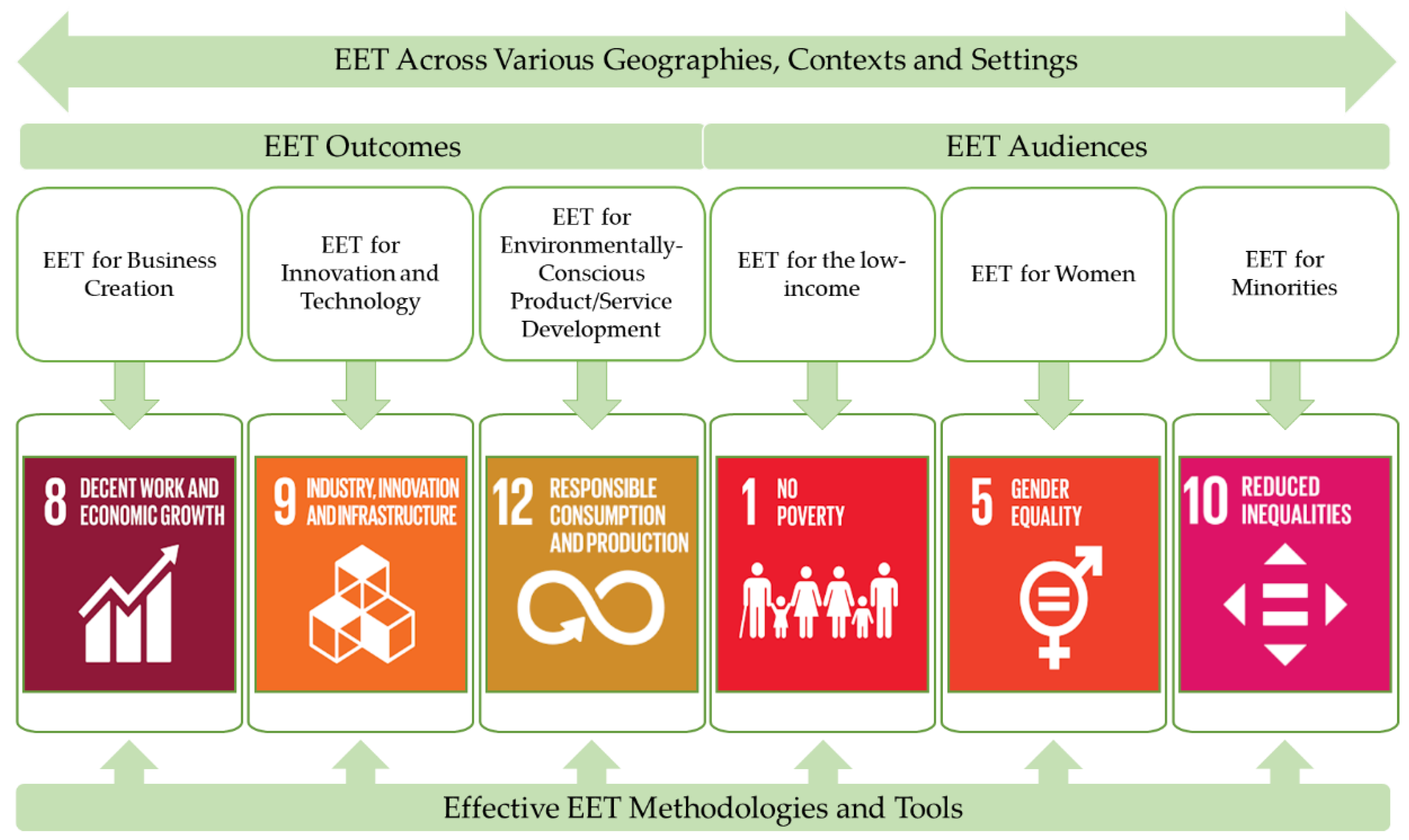

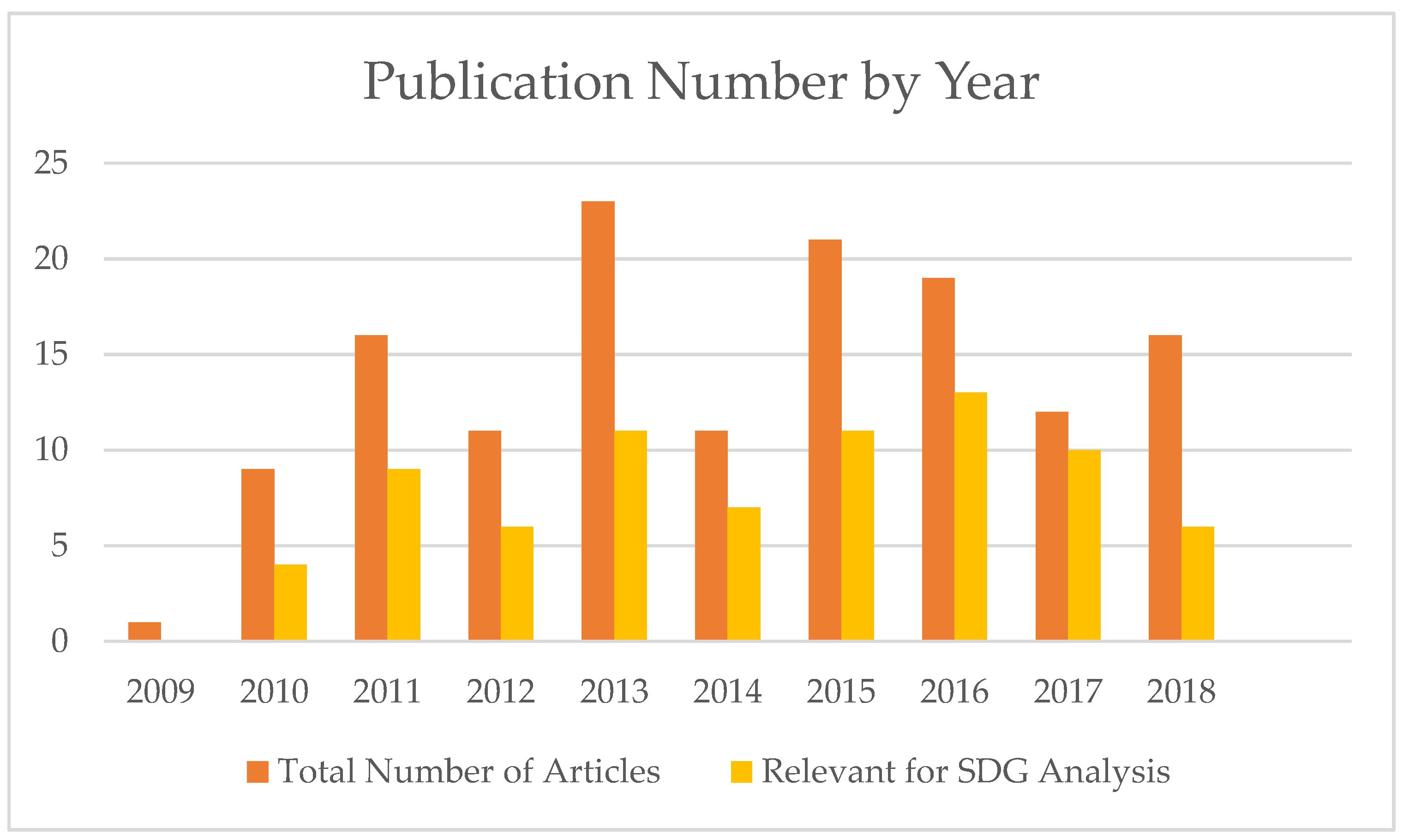

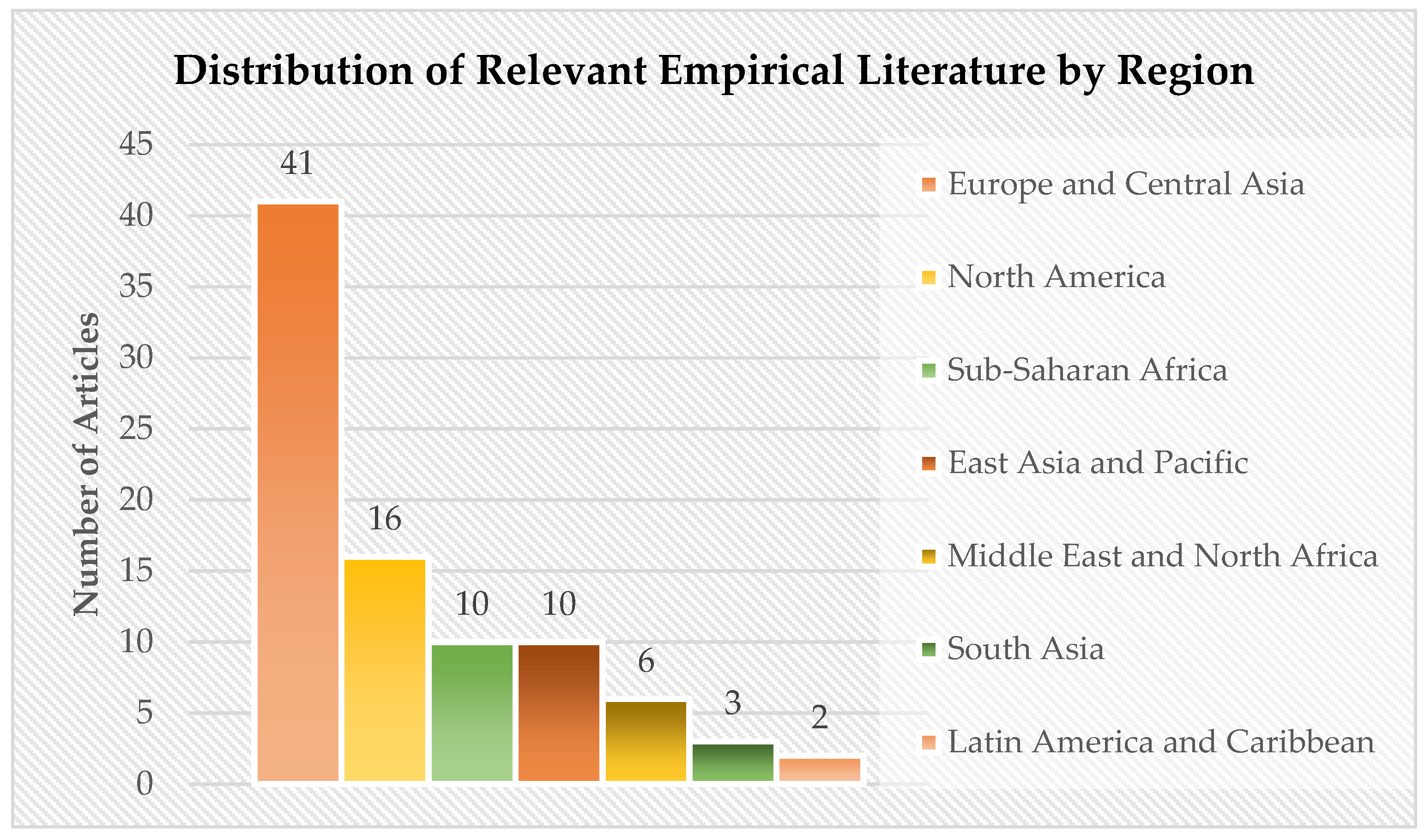
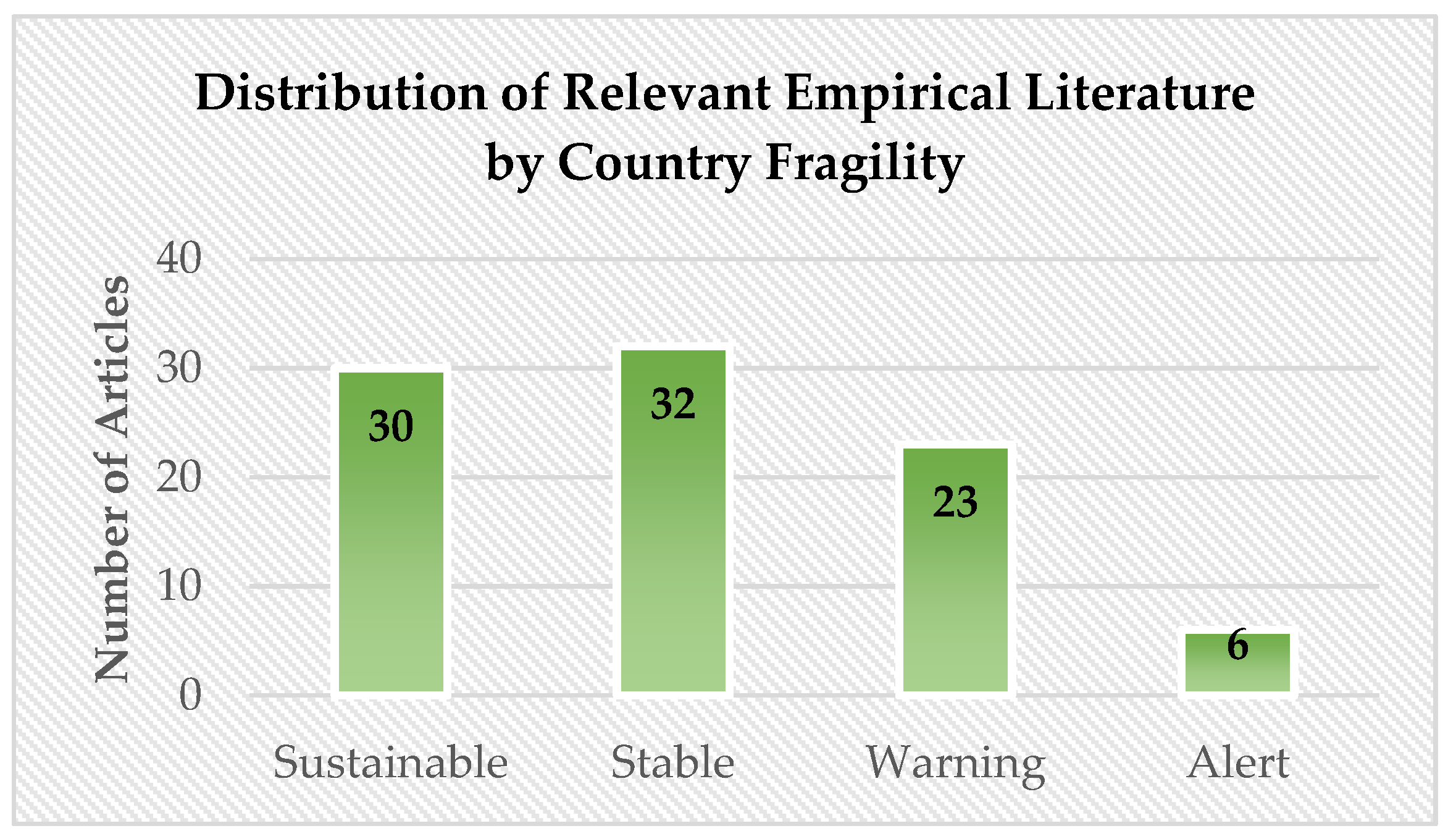
| EET Recipients | All | Sustainable/Stable Countries | Warning/Alert Countries | |||
|---|---|---|---|---|---|---|
| By Age Group/Educational Setting | # | % | # | % | # | % |
| University Students | 61 | 78 | 42 | 75 | 24 | 83 |
| School Students | 10 | 13 | 8 | 14 | 2 | 7 |
| Small Business Owners | 5 | 6 | 4 | 7 | 2 | 7 |
| Unemployed Adults | 5 | 6 | 4 | 7 | 1 | 3 |
| Students in Vocational Training Institutes | 2 | 3 | 2 | 4 | 0 | 0 |
| General Public | 3 | 4 | 3 | 5 | 0 | 0 |
| Academic Staff | 1 | 1 | 1 | 2 | 1 | 3 |
| By Demographic Diversity | ||||||
| Low-Income Individuals | 6 | 8 | 3 | 5 | 4 | 14 |
| Women/Girls | 4 | 5 | 1 | 2 | 3 | 10 |
| Minority Groups | 2 | 3 | 1 | 2 | 1 | 3 |
| Nature of Reviewed EET Programs | All | Sustainable/Stable Countries | Warning/Alert Countries | |||
|---|---|---|---|---|---|---|
| Key Objectives | # | % | # | % | # | % |
| New Business Creation and/or Growth | 75 | 96 | 54 | 96 | 28 | 97 |
| Innovation, Industrialization and Technology | 46 | 59 | 38 | 68 | 10 | 34 |
| Environmentally-Sustainable Products/Services | 1 | 1 | 1 | 2 | 0 | 0 |
| Key Methods and Tools | ||||||
| Experiential Learning Approaches | 50 | 64 | 41 | 73 | 11 | 38 |
| Educational Technology Tools | 7 | 9 | 7 | 13 | 0 | 0 |
| # | Challenge | Country Examples | Select References |
|---|---|---|---|
| 1 | Limited Access to EET Facilities/Programs | Egypt, Brazil, Mozambique, Indonesia, South Africa | [63,101,102,103,104] |
| 2 | Lack of Qualified Educators | Egypt, Mozambique, Brazil, South Africa, India | [101,102,103,104,105] |
| 3 | Lack of Funding for EET | Egypt, Mozambique | [101,102] |
| 4 | Prevalence of Traditional Education | Ukraine, Egypt, Mozambique, Ghana, Namibia, South Africa | [67,101,102,104,106,107] |
© 2019 by the author. Licensee MDPI, Basel, Switzerland. This article is an open access article distributed under the terms and conditions of the Creative Commons Attribution (CC BY) license (http://creativecommons.org/licenses/by/4.0/).
Share and Cite
Rashid, L. Entrepreneurship Education and Sustainable Development Goals: A literature Review and a Closer Look at Fragile States and Technology-Enabled Approaches. Sustainability 2019, 11, 5343. https://doi.org/10.3390/su11195343
Rashid L. Entrepreneurship Education and Sustainable Development Goals: A literature Review and a Closer Look at Fragile States and Technology-Enabled Approaches. Sustainability. 2019; 11(19):5343. https://doi.org/10.3390/su11195343
Chicago/Turabian StyleRashid, Lubna. 2019. "Entrepreneurship Education and Sustainable Development Goals: A literature Review and a Closer Look at Fragile States and Technology-Enabled Approaches" Sustainability 11, no. 19: 5343. https://doi.org/10.3390/su11195343
APA StyleRashid, L. (2019). Entrepreneurship Education and Sustainable Development Goals: A literature Review and a Closer Look at Fragile States and Technology-Enabled Approaches. Sustainability, 11(19), 5343. https://doi.org/10.3390/su11195343




